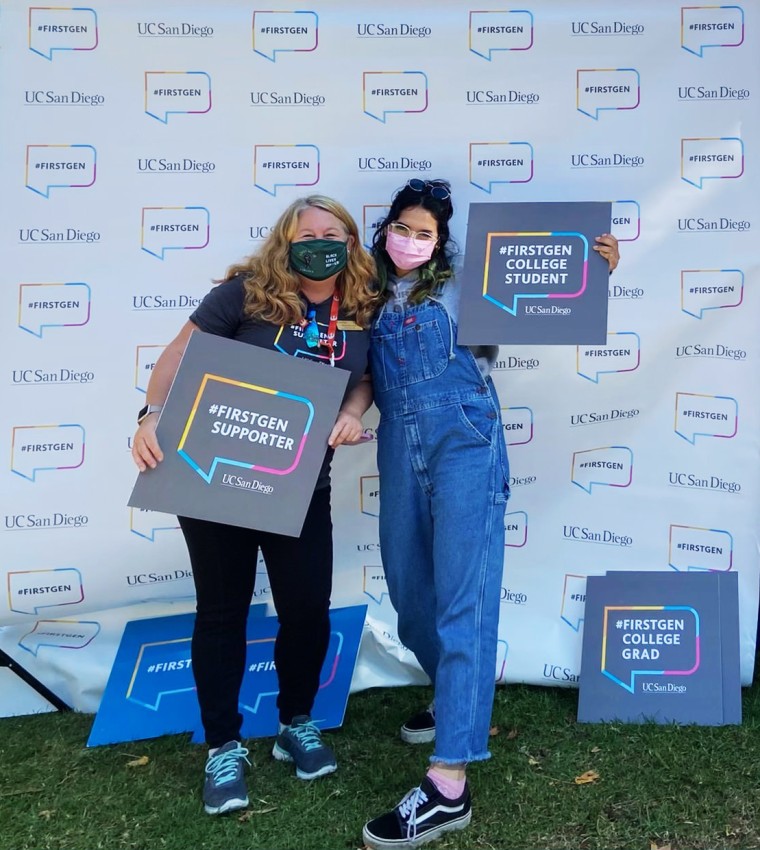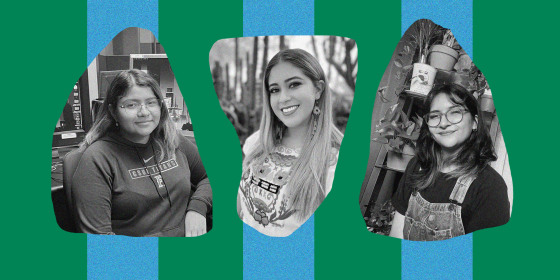ANAHEIM, Calif. — Noemi Rodriguez, 21, aspires to make an impact in her community through her work after college. But as she maneuvers through her final year at University of California, San Diego, balancing school, work and commuting has been an ongoing challenge.
"My mom had told me from the beginning, 'If you want to go to school, it’s going to be on your own account,'" said Rodriguez, who's worked part time at Jamba Juice while going to school full time and taking on a second job in the summer to help pay for tuition and cover some of the family’s bills.
Latinos are more likely to be first-generation college students than any other racial or ethnic group: More than 4 in 10 (44 percent) Hispanic students are the first in their family to attend college, according to educational nonprofit organization Excelencia in Education.
Monday was the annual National First-Generation College Celebration, marking the anniversary of the Higher Education Act of 1965, which greatly expanded college opportunities through financial assistance tools such as grants and work-study programs.
While the celebration is one day, many higher education institutions carry out weeklong and even monthlong celebrations.
In California, Hispanics make up 43 percent of public college undergraduates, according to a report by The Campaign for College Opportunity. The organization, composed of a coalition of groups, aims to boost opportunities for the state's Latinos to attend and graduate from college.
Latino college enrollment and degree obtainment are continuing to rise, and there have been encouraging trends in California, which has the country's largest Latino population, making up almost 4 in 10 (39 percent) Californians. A little over half (51 percent) of the state's Latinos are under 30.
The report noted that almost 9 in 10 (87 percent) of Latino 19-year-olds have a high school diploma or equivalent credential, compared to 73 percent 10 years ago. In the last five years, four-year graduation rates doubled for Hispanics enrolled as full-time, first-year students in the California State University system — from 9 percent to 18 percent for Latinos and from 15 percent to 29 percent for Latinas.
However, only 18 percent of Latino and 29 percent of Latina freshmen at the California State University system are graduating in four years.
Rodriguez is a success coach for the UCSD Student Success Coaching Program, which supports incoming and continuing first-generation students like her through mentoring, helping them balance school and work and giving them access to resources and support services. After graduation, she plans to continue mentoring students, drawing on her own experiences.

The first in her family to attend a four-year university, Rodriguez recalled dealing with impostor syndrome in high school before she was admitted to UCSD, a topic of discussion among many first-generation students.
"When I talked to other people outside of my school, they all did a lot better than me and had higher SAT scores, higher grades," Rodriguez, who is double majoring in political science and ethnic studies at UCSD, said. "Even though I know I did a lot, I didn't think that I was going to get in."
Daisy Gomez-Fuentes, 23, a graduate student at San Diego State University, works for the school's Latinx Resource Center as a peer mentor and graduate assistant.
She provides students with guidance by supporting them across coursework, answering questions they have about classes, advising them on how to ask for letters of recommendation and holding workshops regarding impostor syndrome and best practices to stay organized throughout the semester.
“As a first-gen, I’m paving the way for future generations by breaking cycles and barriers and essentially becoming a resource and a mentor to other first-gen students,” Gomez-Fuentes, who earned a bachelor’s degree earlier this year in Chicana/o/x studies from California State University, Fullerton, said.
She is planning to obtain a doctorate in sociology and become a professor. Under 6 percent of Latinas have a graduate degree, compared to 15 percent for white women.
'I see myself'
For Brenda Elizondo, 21, helping first-gen students is a full-circle moment.
Elizondo works in youth development services for the Boys and Girls Club of Garden Grove, helping many first-generation youths from low-income areas grow as students.
"For me, it really just means a lot because I was part of this program, as well," Elizondo, who's a full-time student at Cal State Fullerton, said.
She said participating in the program as a child helped distract her from troubles at home. There would be times when there wasn’t any food on the table, she said.
Now, as an adult, she juggles three jobs while being the sole caretaker for her mother, who is 42 living with several chronic conditions. As the eldest of her siblings, she also provides for her two younger brothers, who are 17 and 13.
“I do feel like it gets overwhelming,” Elizondo said. “There’s times that I feel like maybe this isn’t for me, maybe I should drop out.” But serving as an example for her brothers is what is motivating her to continue college, she said.
Having her mom and siblings watch her walk at graduation would feel “like crossing that line at a marathon,” Elizondo said. She said she expects to graduate in 2022 and is pursuing a career in journalism to tell stories about people in her community who she feels don’t have a platform.
The guidance Elizondo is providing at the Boys and Girls Club is a step to helping more Latino youth on the pathway to college.
"Being able to offer that support, whether it's emotional, anything, just for these kids, it means a lot," she said, "because when I see them, I see myself."
Follow NBC Latino on Facebook, Twitter and Instagram.

